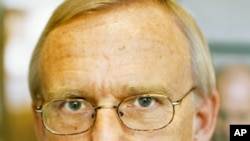Two of the senior Western diplomats in Harare have finished terms of office in Zimbabwe. Before leaving, they spoke out about the difficulties in executing their duties during their tenure.
Sweden's recently departed ambassador to Zimbabwe, Sten Rylander, is well known to many of the former liberation movements in southern Africa, particularly the African National Congress, South Africa's ruling party.
Sweden, unlike most other Western countries, supported the ANC financially and politically for many of the last decades of the anti-apartheid struggle.
He also knew many of the older leaders in President Robert Mugabe's ZANU-PF party when they were fighting to end white minority rule in the former Rhodesia.
Speaking at his embassy in Harare days before his departure, Rylender said he was surprised and shocked when he discovered soon after arriving in Harare nearly five years ago that he could make little diplomatic progress with President Robert Mugabe's ZANU-PF.
"I was well known to them and there was an open door and I was very hopeful at that time that it would be possible to reach results by bridge building, by more intense dialogue, but I soon discovered you can't build bridges between Zimbabwe and the international community when they are so divided as a nation. They need to build bridges between themselves before they can go further," he said.
Rylander, who has been in Africa for 20 years said the worst part of his job was to witness to ZANU-PF's political persecution of the then opposition party, the Movement for Democratic Change (MDC), including a 2007 assault on MDC president and current Prime Minister, Morgan Tsvangirai.
"The other thing was the repression and violence - I was not prepared to condone that," he said. "Remember the events in March in 2007. Some of us went out looking for Morgan Tsvangirai because we thought they were killing him and we went around to police stations to find where he was and we were castigated at that time, by the government. I am very proud of what we did at that time. I have no regrets."
In the wake of the violence against Mr. Tsvangirai and scores of his colleagues, then South African president Thabo Mbeki succeeded in persuading Mr. Mugabe to enter into negotiations with the MDC. The goal was to ensure free and fair elections in Zimbabwe. Despite the negotiations, there was extraordinary political violence against the MDC in 2008 after it narrowly won the general election.
Mr. Tsvangirai, victor in the first round of the presidential poll, withdrew from the run-off because of violence against his supporters. Mr. Mugabe consequently won the second round uncontested.
However regional leaders, in particular South Africa, did not recognize him as president. Negotiations then began in earnest and produced a political agreement nearly two years ago that led to the formation of the inclusive government in February last year.
Rylander said he believes Zimbabwe has turned the corner. And he says, it is time for the EU and United States to lift travel and financial sanctions against Mr. Mugabe and his ZANU-PF colleagues and some companies they control. Rylander says the sanctions are no longer useful in resolving Zimbabwe's political problems, pointing out that Mr. Mugabe uses them within Africa against pro democracy voices.
He says he leaves Zimbabwe with hope, but reflects on moments when ZANU-PF ran a smear campaign against him in the state media. He also has continuing fears about ZANU-PF violence against its political opponents.
"I have been spending a lot of time trying to understand the culture of violence in ZANU-PF, and it goes all the way down long before independence when they had their rifts and discussions, the way they dealt with that was often to kill people, with violence, they have that history, that's why they need to deal with it, both them as a party and Zimbabwe as a nation," he said.
Rylander left Zimbabwe Thursday and retires from Swedish government service later this year.
Outgoing European Union ambassador Xavier Marchal was presented with a farming Oscar earlier this month by the Commercial Farmers' Union for what they said was his outstanding contribution in trying to rebuild Zimbabwe's depleted farming sector.
An agronomist by training, Marchal admits he became "very involved" during his term of office in Zimbabwe and understood personally what many white farmers and their workers had been through during the last ten years of ZANU-PF invasions of white-owned farms.
"I think Zimbabwe was special for me because I have gone through that, because I was born in the Congo," he said. "My father had a plantation which he lost and I witnessed that when I was a teenager so I have been exposed to that and I think that is the reason I became so involved in Zimbabwe."
Like many other Western diplomats, Marchal says he remains frustrated at the slow pace of political reforms in Zimbabwe since the inception of the inclusive government. Most political analysts in Zimbabwe say political violence has decreased, but blame Mr. Mugabe for delays in political reform. Marchal regrets that he leaves Zimbabwe before some key issues of the political agreement remain outstanding as he says the EU longed for political stability so it could contribute to Zimbabwe's reconstruction.
"I am a bit sad because I would have wished things to have moved forward further than that," he said. "In that sense I think I am a little bit disappointed because a lot of time is wasted. If people had listened better or to each other or been a little bit more genuine maybe, things would have moved faster. I would have been used better than I was."
Marchal left Zimbabwe a few days ago and becomes EU Ambassador in Ethiopia. He said before leaving that he will return to Zimbabwe one day.




